

Study: Poor Kids Who Believe in Meritocracy Suffer - The Atlantic. Brighton Park is a predominantly Latino community on the southwest side of Chicago.
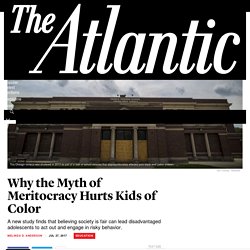
It’s a neighborhood threatened by poverty, gang violence, ICE raids, and isolation—in a city where income, race, and zip code can determine access to jobs, schools, healthy food, and essential services. It is against this backdrop that the Chicago teacher Xian Franzinger Barrett arrived at the neighborhood’s elementary school in 2014. Recognizing the vast economic and racial inequalities his students faced, he chose what some might consider a radical approach for his writing and social-studies classes, weaving in concepts such as racism, classism, oppression, and prejudice.
Barrett said it was vital to reject the oft-perpetuated narrative that society is fair and equal to address students’ questions and concerns about their current conditions. “If the system is fair, why am I seeing that everybody who has brown skin is in this kind of job? The Cycle Of Poverty Is Psychological, Not Just Financial. When thinking about those who are less fortunate, it’s often said that you should put yourself in someone else’s shoes.
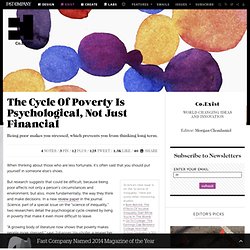
But research suggests that could be difficult, because being poor affects not only a person’s circumstances and environment, but also, more fundamentally, the way they think and make decisions. In a new review paper in the journal Science, part of a special issue on the “science of inequality,” two researchers detail the psychological cycle created by living in poverty that make it even more difficult to leave. “A growing body of literature now shows that poverty makes people more stressed,” says Johannes Haushofer, a researcher at MIT’s Poverty Action Lab.
How economic inequality is damaging our social structure. One of the most significant problems in the world now is that of economic inequality, and the social problems it produces. And the most damaging impact may be in developed nations such as the U.S. and Canada. The U.S. in particular has the greatest gap in wealth among all developed nations, and the problem it is causing is becoming more apparent with each passing day. During the recession in the U.S., at least 6 million people have lost their jobs; 25 million are underemployed. Eight trillion dollars of middle class wealth has been destroyed in the housing collapse. Happiness and Inequality: Don't Worry, Be More Equal. If we grow apart as we grow economically, researchers show in a landmark new study on happiness and inequality, we will never grow more happy.
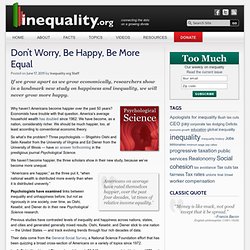
Why haven’t Americans become happier over the past 50 years? Economists have trouble with that question. America’s average household wealth has doubled since 1962. We have become, as a nation, considerably richer. We should be much happier, too, at least according to conventional economic theory. Income inequality correlated to mortality rate. Myth: Income inequality is not the cause of this nation's social problems. Fact: Studies by Harvard and Berkeley prove the correlation, and strongly suggest causation. Summary Poverty is correlated to higher mortality rates for all ages. Harvard and Berkeley conducted two studies that also found that income inequality, as opposed to absolute standard of living, is responsible for higher death rates, as well as numerous other social problems like crime, welfare, and poor educational outcomes. Conservatives point out that correlation is not causation; it could be that people suffering from these health and social problems naturally earn lower incomes.
Argument Health researchers have long known that the poor have higher death rates and greater health problems than the rich. (1) Countless studies have proven this; the following one yields a typical result. Shocker stat of the day: life expectancy decreases by 4 years among poor white people in the U.S. September 22, 2012 7:24 AMShocker stat of the day: life expectancy decreases by 4 years among poor white people in the U.S.
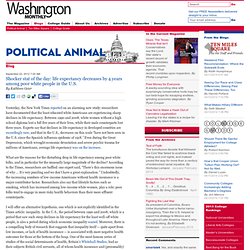
By Kathleen Geier Yesterday, the New York Times reported on an alarming new study: researchers have documented that the least educated white Americans are experiencing sharp declines in life expectancy. Between 1990 and 2008, white women without a high school diploma lost a full five years of their lives, while their male counterparts lost three years. And Health: An Epidemiological Stopwatch. New research has helped answer a nagging question among scientists who study population health: How much time has to elapse before a society growing more unequal will start paying the price — in higher rates of illness and death?
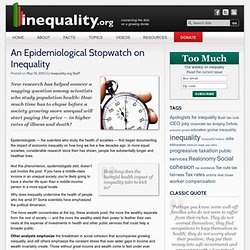
Epidemiologists — the scientists who study the health of societies — first began documenting the impact of economic inequality on how long we live a few decades ago. In more equal societies, considerable research since then has shown, people live substantially longer and healthier lives. The Equality Trust. Richard Wilkinson: How economic inequality harms societies. Income Inequalities and Social Ills. Daniel Little: Income inequalities and social ills, by Daniel Little: According to Kate Pickett and Richard Wilkinson in The Spirit Level: Why Greater Equality Makes Societies Stronger, income inequalities in a society are a source of a variety of social problems in that society, almost without regard to the absolute level of income in the society.
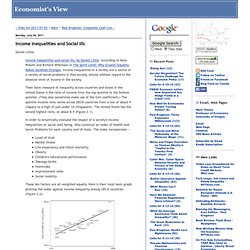
Their basic measure of inequality across countries and states in the United States is the ratio of income from the top quintile to the bottom quintile. (They also sometimes make use of the Gini coefficient.) The quintile income ratio varies across OECD countries from a low of about 4 (Japan) to a high of just under 10 (Singapore). We need Occupy to help deliver equality. Greed Isn't Good: Wealth Could Make People Unethical. As an individual’s wealth and status rise, so does their tendency to be unethical, concludes a new study of the relationship between socioeconomics and ethics.
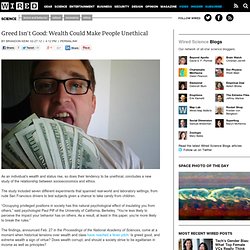
The study included seven different experiments that spanned real-world and laboratory settings, from rude San Francisco drivers to test subjects given a chance to take candy from children. “Occupying privileged positions in society has this natural psychological effect of insulating you from others,” said psychologist Paul Piff of the University of California, Berkeley. Rich People Lack Empathy, Study Finds. Social psychologists are making an argument that Occupy Wall Street protesters have been saying for months: Many rich people just aren't in the habit of thinking of others.
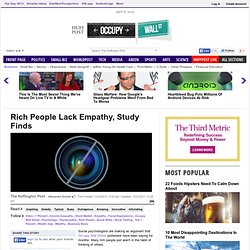
According to researchers at the University of California-Berkeley, people who grew up in economically comfortable circumstances are less attuned to the suffering of other people. In multiple trials that involved both questionnaires and physical-response tests, the researchers found that young adults whose upbringing involved some degree of financial struggle were quicker and more likely to register signs of empathy than young adults who came from affluent backgrounds. Such conclusions are especially relevant now, as the Occupy movement continues to focus national attention and criticism on the growing divide between rich and poor. America’s Generosity Divide - How America Gives. By Emily Gipple and Ben Gose Note: A longer version of this story ran in the August 19, 2012 print edition and is available to subscribers here.
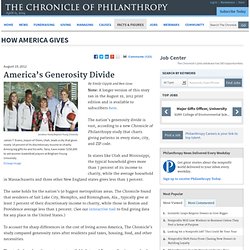
The nation’s generosity divide is vast, according to a new Chronicle of Philanthropy study that charts giving patterns in every state, city, and ZIP code. In states like Utah and Mississippi, the typical household gives more than 7 percent of its income to charity, while the average household in Massachusetts and three other New England states gives less than 3 percent. Have the Super-Rich Seceded From the United States? RussellSageIncomeSegregationreport.pdf (application/pdf Object) Infographic: The Average Income For Every Neighborhood In America.
No matter where you live, you probably already have some sort of mental map of where the money resides in your city.
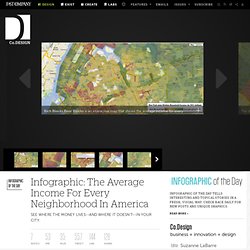
The Gated Community Mentality. Under assault, I didn’t dream of harming my teenage assailant, let alone taking his life. Mr. Zimmerman reacted very differently, taking out his handgun and shooting the youth in cold blood. Why Our Elites Stink.